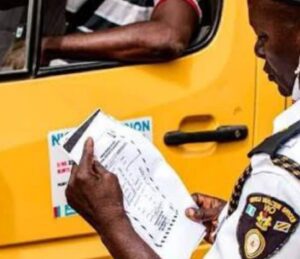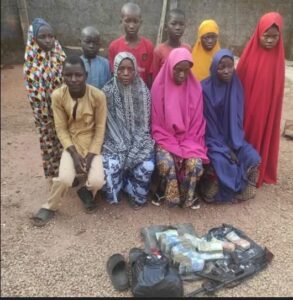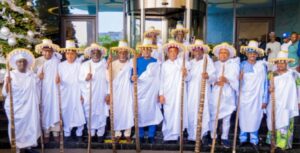Ambode: Between EFCC’s noose and Lagos Assembly’s dagger

Months after the 2019 general elections, ex-governor Akinwumi Ambode of Lagos State and partymen believed to be loyal to Asiwaju Bola Tinubu have yet to even the score, Eniola Akinkuotu reports
This time last year, former Governor Akinwunmi Ambode of Lagos State probably would have thought he would still be the chief executive of the nation’s economic nerve centre and most populated city.
He would have pictured himself superintending the affairs of over 200 ministries and parastatals, controlling more funds than the Presidents of some African nations.
Unfortunately for the chartered accountant, however, the power brokers of Lagos State deemed him unworthy of a second term in office and ensured that he was defeated at the All Progressives Congress governorship primary in October 2019.
The controversial primary led to the emergence of Babajide Sanwo-Olu as the ruling party’s standard bearer and eventually the governor of the state in the February 2019 general elections.
Having left the office and stripped of his immunity with no political cover, the erstwhile governor has begun fighting the biggest battle of his life, failure of which could land him in prison.
As governor, Ambode had been accused of being aloof and stingy. Not only that, he failed to satisfy party leaders, allegedly embarked on a political vendetta against his perceived enemies within the party and went ahead to modify lucrative contracts of some party leaders like the refuse disposal scheme in the state otherwise known as Private Sector Partnership or PSP.
He had explained that there was a need for the issue of waste to be properly addressed which would also entail waste processing, recycling and an engineered landfill which would ensure that the entire value chain was exploited.
A foreign firm, Visionscape Sanitation Solutions, was given the exclusive rights to domestic waste at a rate of N85bn which would last for 10 years but the opportunity cost was too high as it translated to the PSP contractors (mostly party leaders) getting the less lucrative industrial waste.
According to insiders, Ambode’s trouble worsened late last year when he refused to peacefully step aside and support Sanwo-Olu as the party’s choice based on the directive of the Governor’s Advisory Council; instead, he decided to hold a press conference wherein he described his would-be successor as one with questionable mental health.
It was further alleged that after Sanwo-Olu had been chosen as the APC standard bearer, Ambode failed to fund the party, refused to support the governorship candidate’s campaign and also starved the Lagos State House of Assembly of the needed funds in a crucial election year.
Rumours began to spread that the Assembly was planning to impeach the governor and pave the way for his deputy, Oluranti Adebule, to take over amid allegations that Ambode had failed to release funds for constituency projects.
The tension was, however, doused by the National Leader of the APC, Asiwaju Bola Tinubu, who summoned a meeting of stakeholders. He informed the press that plans to impeach Ambode had been called off.
According to Lagos APC leaders, even after that meeting, rather than support the party in the state, Ambode preferred to accompany President Muhammadu Buhari on a nationwide campaign with the hope that he would be compensated with a ministerial appointment.
Ambode became less visible in state campaigns and the party continued the electioneering without him. However, after the elections had been won, there was no longer any need for the facade of unity.
The gloves could now be taken off without any political implication.
First, Ambode began rushing to complete most of his projects with a view to inaugurating them ahead of the May 29, 2019 handover date.
He invited President Muhammadu Buhari to inaugurate some of the projects which included- a maternal and child health centre at the Lagos State Teaching Hospital, a bus terminal interchange at Oshodi, a 10-lane road leading to the Murtala Muhammed International Airport and the Lagos Theatre House at Oregun, Ikeja.
Some of the projects inaugurated had yet to be completed.
For instance, the 10-lane Oshodi- Murtala Muhammed International Airport was not close to completion and far from being ready for public use.
Analysts believe that Ambode did not want his successor to take the glory for the completion of the projects hence his decision to hastily inaugurate them.
Interestingly, many of the party chieftains in Lagos refused to attend the event despite the President’s presence at the programme.
In what could be described as an attempt to spite the governor, the Lagos State House of Assembly also refused to submit the budget to him for signing.
The legislative arm allegedly increased the budget proposal submitted by Ambode by N21bn but held on to the budget for over a month until the governor left the office.
The amended budget proposal was subsequently submitted to Sanwo-Olu for immediate signing into law.
Ambode, who had become an anathema to the party in the state, also did not attend the inauguration ceremony of his successor as is customary but decided to travel out of the country immediately while also lobbying for a ministerial position in the President’s cabinet.
However, Tinubu’s men allegedly had other things planned for the former governor.
A month after leaving office, it was alleged by Ambode’s camp that the Tinubu-led APC in the state had been giving the Economic and Financial Crimes Commission information with a view to probing him so that he would not be considered for a federal appointment.
Soon after, the anti-graft agency began investigating the former governor in a highly publicised manner.
The EFCC stated in court documents that it was investigating Adewale Adesanya, the Permanent Secretary in the Office of the Chief of Staff to the former governor.
In an affidavit deposed to by Kunmi Daniel, an operative of the commission, it stated that there was “a huge inflow of N9,927,714,443.29” from the state accounts into an FCMB bank account opened on September 17, 2018, during the administration of Ambode and operated by Adesanya.
Unconfirmed findings by Sunday PUNCH, however, revealed that Adesanya was never the permanent secretary as claimed by the EFCC. Rather, Mr Sewedo Whenu has held that position since January 2017.
The EFCC subsequently asked the court to freeze the account.
However, the EFCC later stated in a press release that the funds itself were directly linked to Ambode. Interestingly, this information was not expressly stated in the court papers.
Two weeks later, the EFCC conducted a search of Ambode’s houses in Ikoyi and Epe.
While the search on the Ikoyi home was without incident, that of Epe – Ambode’s strongest political base – was a direct opposite.
Men of the EFCC led by one of its prosecutors, Rotimi Oyedepo, attempted to search the house but escaped being lynched by irate youths that believed that the former governor was being persecuted by the APC leadership.
The youth vandalised the EFCC vehicles and accused the operatives of being used by Tinubu to settle a political score.
The former governor, who was said to be out of the country, however, denied involvement in the attack on the EFCC men.
He lamented that the commission had neither invited nor contacted him for any clarification since the highly publicised investigation.
Before the dust could settle, the Lagos Assembly, which is known to be loyal to Tinubu, announced plans to probe Ambode over N45bn spent on the procurement of buses.
The fund, it was learnt, was obtained from the Paris Club refund disbursed by the Federal Government in 2017.
The fund was said to have been used for the construction of modern bus parks and the purchase of buses without the express approval of the Lagos State House of Assembly, an allegation which Ambode’s media team has denied.
The Assembly subsequently set up a committee to investigate the purchase of 820 out of the 5, 000 buses.
In a motion, Gbolahan Yishawu (Eti Osa 2), noted that at an executive/legislative parley at Golden Tulip in FESTAC in September 2017, Ambode informed the lawmakers that 5,000 buses would be bought by the state government.
The lawmaker stated that the executive proposed to spend N17bn to purchase the buses in the 2017 budget, but that this was not approved by the Assembly.
“In the 2018 and 2019 budgets, the state government proposed N24 billion and N7 billion respectively, but these were not approved.
“The state government still went ahead to import 820 buses at N7bn, and out of that, 520 are still awaiting clearance at the ports,” he said.
A company headed by Fola Tinubu, Primero Transport Services Limited, was said to have been hard hit by Ambode’s decision to purchase the buses and make the transport market more competitive.
Primero, which is said to enjoy a monopoly of sorts, operates the BRT buses that ply the TBS- Ikorodu route; the company would have been affected by Ambode’s decision to open up the market.
However, a former aide to Ambode told our correspondent that the allegations against the former governor were baseless.
He said, “In December 2017, when the 2018 budget was submitted, N24bn was earmarked for the proposed transport reform and purchase of buses. It was part of the total budget of N1.46tn passed in January 2018 by the House.
“That budget included the N24bn appropriated for bus reform and it was passed. However, there was a clause from the House that the executive should revert to the legislative for special approval before utilising the fund. This was hitherto unknown to law and the executive considered it unconstitutional.
“So, between May 2018 and May 2019, funds were utilised for the purchase of forex and transferred offshore to bus suppliers.
“The reason why more was spent in 2019 without approval from the House was that the budget was delayed. And the constitution allows the governor to spend 25 per cent of a previous year’s budget every quarter and that is what was done.”
The source said it was true that 520 buses had not yet been cleared but Ambode had approached the Federal Government for a waiver.
He said the buses were in Coscharis’ bonded warehouse.
He noted that 35 out of the 300 buses cleared so far had been handed over to civil servants by Sanwo-Olu in June while the rest had been integrated into the BRT scheme.
The Executive Director, Centre for Anti-corruption and Open Leadership, Mr Debo Adeniran, described the probe of Ambode as politically motivated.
Adeniran said the former governor’s only error was his refusal to put the powerful politicians in Lagos State ahead of the people.
He said, “The probe, I think, is an attempt to give a good dog a bad name in order to hang it. I know that Ambode could have meant well for Lagosians but the politicians did not hide their disdain for his disinterest for politicising developmental efforts in Lagos State
“He could have refused to give contracts to politicians rather than experts who could actually do the work but he refused to do so. The buses in question were supplied and are not meant for the governor’s use but for the good people of Lagos.
“The effort by his detractors to run him down was to dissuade the President from giving him a federal appointment. I think this is unfair.”
Also speaking, the Publicity Secretary of the opposition Peoples Democratic Party in the state, Taofik Gani, stated that everything was being done to smear Ambode’s name.
Gani said the entire probe was being orchestrated by the APC in the state led by Tinubu and it was unfortunate that it was not done in the interest of Lagosians but to settle a score.
The EFCC, however, claimed that Ambode’s case was not a political witch-hunt but one based on intelligence even as it maintained that the former governor no longer had immunity and thus should be open to a probe.
A chieftain of the APC in the state who was a spokesperson for the ruling party in the state, Joe Igbokwe, however, refused to comment on the probe.
As the former governor continues to fight to untangle himself from an alleged web of conspiracy and corruption, it remains to be seen if he would come out unscathed or in chains.












